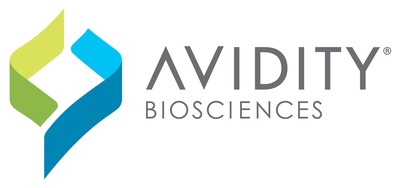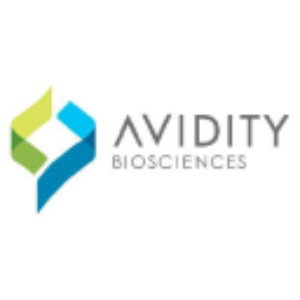Avidity Biosciences Honors Rare Disease Day®
"This Rare Disease Day, we join with others around the world to show our commitment in bringing awareness to rare diseases. Today, we are honored to welcome members from our patient advisory council to Avidity as part of our commitment to listening, learning, and partnering with the patient community," said
Avidity has three distinct rare disease programs in clinical development: AOC 1001 for myotonic dystrophy type 1 (DM1) in the Phase 1/2 MARINA™ trial and the MARINA open label extension (MARINA-OLE™); AOC 1020 in the Phase 1/2 FORTITUDE™ trial for the treatment of facioscapulohumeral muscular dystrophy (FSHD); and AOC 1044 in the Phase 1/2 EXPLORE44™ trial for the treatment of Duchenne muscular dystrophy (DMD) mutations amenable to Exon 44 skipping (DMD44).
"Rare Disease Day is an important time of recognition for the continued commitment and ongoing work from those organizations and individuals in the rare disease fight," said
Rare Disease Day takes place on the last day of February each year with the goal to raise awareness of many different rare diseases worldwide. EURORDIS established Rare Disease Day in 2008 and coordinates with more than 65 national alliance patient organizations each year to honor those living with rare diseases.
About Myotonic Dystrophy Type 1
Myotonic dystrophy type 1 (DM1) is an underrecognized, progressive and often fatal disease caused by a triplet-repeat in the DMPK gene, resulting in a toxic gain of function mRNA. The disease is highly variable with respect to severity, presentation and age of onset, however all forms of DM1 are associated with high levels of disease burden and may cause premature mortality. DM1 primarily affects skeletal and cardiac muscle, however patients can suffer from a constellation of manifestations including myotonia and muscle weakness, respiratory problems, fatigue, hypersomnia, cardiac abnormalities, severe gastrointestinal complications, and cognitive and behavioral impairment. Currently, there are no approved treatments for people living with DM1.
About Facioscapulohumeral Muscular Dystrophy (FSHD)
Facioscapulohumeral muscular dystrophy (FSHD) is characterized by progressive and often asymmetric skeletal muscle loss that typically causes weakness initially in muscles in the face, shoulders, arms and trunk and progresses to weakness in muscles in the lower body. FSHD is an autosomal dominant genetic disease. The abnormal expression of DUX4 (double homeobox 4) leads to a series of downstream events that result in skeletal muscle wasting and progressive loss of muscle function, including an inability to lift arms for more than a few seconds, loss of ability to show facial expressions, and serious speech impediments. These symptoms cause many people affected by FSHD to become dependent on the use of a wheelchair for mobility. Currently, there are no approved treatments for people living with FSHD.
About Duchenne muscular dystrophy (DMD)
Duchenne muscular dystrophy (DMD) causes a lack of functional dystrophin that leads to stress and tears of muscle cell membranes, resulting in muscle cell death and the progressive loss of muscle function. The dystrophin protein maintains the integrity of muscle fibers and acts as a shock absorber through its role as the foundation of a group of proteins that connects the inner and outer elements of muscle cells. People living with DMD suffer from progressive muscle weakness that typically starts at a very young age. Over time, people with Duchenne will develop problems walking and breathing, and eventually, the heart and respiratory muscles will stop working. Those living with the condition often require special aid and assistance throughout their lives and have significantly shortened life expectancy. While there are treatments approved to treat people with DMD, there remains a very high unmet need. DMD is a monogenic, X-linked, recessive disease that primarily affects males, with 1 in 3500 to 5000 boys born worldwide having Duchenne.
About Avidity
Forward-Looking Statements
Avidity cautions readers that statements contained in this press release regarding matters that are not historical facts are forward-looking statements. These statements are based on the company's current beliefs and expectations. Such forward-looking statements include, but are not limited to, statements regarding: the progression of clinical programs for AOC 1001, AOC 1044 and AOC 1020 and timing of ongoing and planned clinical trials; the potential of Avidity's product candidates to treat rare diseases; the potential of AOCs to target a range of different cells and tissues beyond the liver; the potential of AOCs to treat cardiac and immunological diseases; and Avidity's plans to expand its AOC platform into additional muscle diseases. The inclusion of forward-looking statements should not be regarded as a representation by Avidity that any of these plans will be achieved. Actual results may differ from those set forth in this press release due to the risks and uncertainties inherent in Avidity's business, including, without limitation: the FDA may not remove the partial clinical hold related to the MARINA study and the analysis related to the underlying cause of the related serious adverse event may result in delays in the MARINA study or an inability to complete the study; the Phase 1/2 MARINA trial results are based on a preliminary analysis of interim data available as of the data cutoffs, and, as with our other preclinical studies and clinical trials, the interim results may materially differ from final results of the trial; one or more of the safety or biomarker results in the Phase 1/2 MARINA trial may materially change following more comprehensive reviews of the data, as follow-up on the outcome of any particular patient continues, as and if additional patients enroll in the trial and as more patient data become available, any of which may materially alter the findings and conclusions from Avidity's preliminary analysis; unexpected adverse side effects or inadequate efficacy of Avidity's product candidates that may delay or limit their development, regulatory approval and/or commercialization, or may result in clinical holds, recalls or product liability claims; Avidity is early in its development efforts; Avidity's approach to the discovery and development of product candidates based on its AOC platform is unproven, and the company does not know whether it will be able to develop any products of commercial value; potential delays in the commencement, enrollment and completion of preclinical studies or clinical trials; the success of its preclinical studies and clinical trials for the company's product candidates; Avidity's dependence on third parties in connection with preclinical and clinical testing and product manufacturing; Avidity could exhaust its available capital resources sooner than it currently expects; and other risks described in filings with the
Investor Contact:
(858) 401-7900 x550
investors@aviditybio.com
Media Contact:
(858) 401-7900 x550
media@aviditybio.com
![]() View original content to download multimedia:https://www.prnewswire.com/news-releases/avidity-biosciences-honors-rare-disease-day-301757346.html
View original content to download multimedia:https://www.prnewswire.com/news-releases/avidity-biosciences-honors-rare-disease-day-301757346.html
SOURCE







